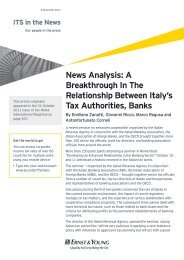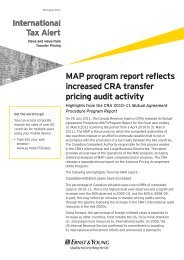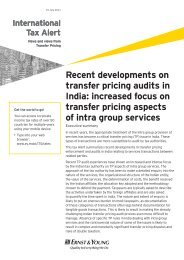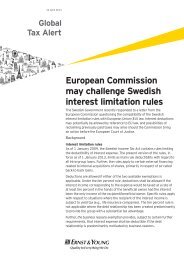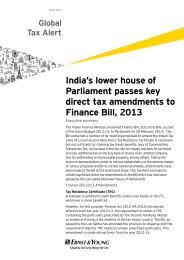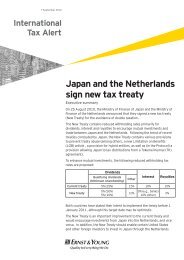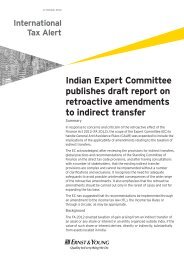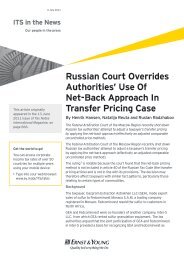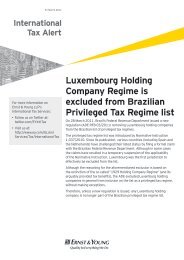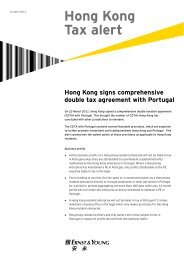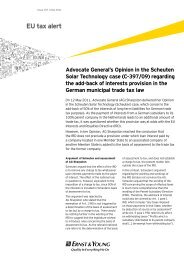(GST) compliance obligations (pdf, 5.62 MB) - Ernst & Young T ...
(GST) compliance obligations (pdf, 5.62 MB) - Ernst & Young T ...
(GST) compliance obligations (pdf, 5.62 MB) - Ernst & Young T ...
You also want an ePaper? Increase the reach of your titles
YUMPU automatically turns print PDFs into web optimized ePapers that Google loves.
Where to<br />
from here?<br />
The VAT complexity faced by MNEs leads<br />
to uncertainty, errors, disputes and<br />
increased cost. For companies, 100% VAT<br />
<strong>compliance</strong> seems at best very costly and<br />
at worst impossible. The current situation,<br />
based heavily on local rules, is also<br />
damaging to tax administrations, which<br />
are experiencing unprecedented calls on<br />
their scarce resources in collecting vital<br />
tax revenues and preventing tax fraud.<br />
We believe that reducing the <strong>compliance</strong><br />
burden can improve VAT <strong>compliance</strong><br />
performance by the largest VAT taxpayers,<br />
thereby protecting vital tax revenues as<br />
governments address budget deficits.<br />
All parties have a role to play. MNEs need<br />
to take their multinational VAT <strong>compliance</strong><br />
<strong>obligations</strong> seriously. Multinational VAT<br />
<strong>compliance</strong> must remain a management<br />
priority. All over the world, MNEs must<br />
continue to devote resources to keeping<br />
abreast of developments that affect their<br />
VAT position training staff and adopting<br />
adequate VAT accounting processes and<br />
controls, in recognition of the large volumes<br />
of VAT revenues that flow through their<br />
accounting systems.<br />
At the same time, tax administrations<br />
need to address MNEs’ legitimate concerns<br />
about the burden of multinational VAT<br />
<strong>compliance</strong>, which increases costs, creates<br />
high levels of tax risk and has an adverse<br />
effect on their business operations.<br />
We believe that individual tax<br />
administrations, trading blocs, such as the<br />
EU, and international organizations, such<br />
as the OECD, should make multinational<br />
VAT reform a priority. This is a pressing<br />
issue as globalization continues apace.<br />
We applaud the work of the OECD in<br />
producing Draft VAT Guidelines aimed at<br />
bringing clarity and consistency to the<br />
VAT treatment of cross-border activities.<br />
We also commend the continuing efforts<br />
at harmonization and simplification<br />
undertaken by the EU, including programs<br />
related to e-invoicing and the extension of<br />
the “one-stop-shop” regime for foreign VAT<br />
registrations. We hope that other countries<br />
in Europe, such as Switzerland and Norway,<br />
continue to align their VAT legislation with<br />
the EU where practicable. We would also<br />
encourage greater regional cooperation on<br />
VAT legislation and administrative practice<br />
in other regions of the world, such as the<br />
Americas, Africa and Asia Pacific.<br />
We would also like to see MNE taxpayers<br />
and tax administrations enter into closer,<br />
more open relationships based on trust<br />
and transparency. This may be achieved<br />
both through informal changes in attitude<br />
and through formal programs. Examples<br />
around the world include the use of<br />
binding rulings, taxpayer guidance, the<br />
use of new technology to allow taxpayers<br />
to fulfill their <strong>obligations</strong> remotely, the<br />
allocation of designated tax inspectors<br />
and the introduction of programs such as<br />
“horizontal monitoring” in The Netherlands<br />
and the ATO’s ACA program in Australia,<br />
which encourage taxpayers to adopt robust<br />
processes and disclose errors, in return<br />
for “reduced penalties” and “light-touch”<br />
oversight.<br />
MNE taxpayers and tax administrations<br />
all have much to gain from greater<br />
multinational simplicity, harmonization,<br />
clarity and fairness in the VAT system —<br />
reduced costs, less tax controversy, better<br />
use of scarce resources and improved<br />
VAT <strong>compliance</strong> performance. Achieving<br />
100% VAT <strong>compliance</strong> may no longer be an<br />
unattainable dream.





